By Poor William
CLARKSDALE, MISSISSIPPI – The MISSISSIPPI DELTA is a land and culture brimming with complex contradictions, a veritable mélange of befuddlements, commingling like silt, water, and snowmelt, as they bend and blend into one giant “muddy” mix of tranquility and roiling turgidity, disseminating a nation’s runoff into a thirsty, yet strangely self-sufficient land rampant with characters and molded by terroir, hard times, and Hope, always Hope.
The phrase, True Delta, is an important redundancy of sorts, as all things in the Delta are true, or at least authentic. The Mississippi Delta’s gritty mix of poverty, wealth, climate, history, and heritage provide grist for media striving to celebrate or malign a culture–familiar, yet mysteriously foreign to those having made its acquaintance or desiring to understand it.
True Delta is a well written, beautifully photographed, meticulously documented 37-minute Lucky Find Productions video produced by E.B. Blakney (a Delta Bohemian), written by Lee Quinby, edited by Daniel Cowen (Director of Photography), directed by Quinby and Cowen, with still photography by Michael Scanlan Photography. For impressive bios about the creative folks at Lucky Find go to truedeltaproject.org.
Billed as “a cinematic snapshot of the Blues tradition that remains vibrant in and around Clarksdale, Mississippi—the renowned birthplace of the Blues,” the film aptly captures the feel and realities of a culture still very much alive, and as organic, familiar and wild as the very river that nurtures and defines it.
True Delta opens with a black screen and the off-white sound of moving water as the peripatetic Old Man River washes gently lapping waves against a levee system engineered to restrain the river’s rogue potential.
Shards of grey-penetrating sunlight precede a laconic barge shadowing the distant shoreline as the first words presage True Delta, “A century ago, a mix of spirituals, ballads, and field hollers gave rise a new kind of music.”
[youtube]http://youtu.be/Fq0CDr0Stx8[/youtube]
A riverboat whistles two long toots, while invisible breaths of continuous wind undulate atop a Delta wheat field—stirring, always moving.
“As one generation passes on…” announces the ubiquitous sight of decidedly Delta railroad tracks leading to misty horizons flecked with creosote-soaked Delta crucifixes, effortlessly transmitting telephone and data messages across a land reticulated with poles, row crops, oxbows, and redwing blackbirds.
The sound of cricket legs furiously colliding belies the fact that little moves but time, and that more slowly than elsewhere. “…Another carries on…”
The segment, “Keeping the Blues Alive” opens with a feral Delta cat picking at what it might find in the windswept, dirt yard at the infamous Po Monkey’s Lounge near Merigold, MS.
Next, a street corner provides the backdrop for blues music. The familiar Delta scene easily recognizable by both locals and visitors: Blue skies accented with puffy white clouds, a crossroad’s street named after a dead president, a stop sign tagged with black spray paint, and a presumably vacant house with broken window panes framed beneath by a shrub or two and unkempt grass held at bay only by the dearth of cultivation and nurture. An adult black male with a young female child seen on the corner typify a common sight in the Mississippi Delta.
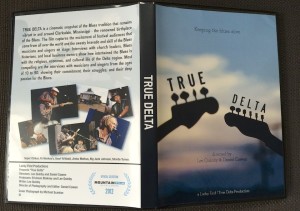
DVD cover for True Delta documentary
Visit SHOP.DELTABOHEMIAN.COM to order this DVD.
“Kids are being born, but nobody is teaching them,” notes Mr. Johnny Billington, founder of the Blues Academy. He concludes if the now generation is not taught the blues that the music will die. Mr. Johnny is playing in the background as the lens zooms in on his beautiful hands, hands at home on a guitar.
“Will the torch be passed on?” Delta State University’s Luther Brown asks rhetorically. “Yes it will, but it will not be the same torch!”
Brown notes the old-school, real-deal blues musicians grew up with sharecropping, mules, cotton and Jim Crow. This informed their music; this is the blues.
True Delta hosts an ensemble of characters readily recognizable to longtime Delta visitors, locals and those with an affinity for the blues and Delta culture. Lucky Find Productions authentic representation of Delta musicians and those who love them puts the True in Delta.
The documentary aptly portrays many of the complex contradictions seen in Delta living. Whites and blacks in the Delta may not always understand each other as a race, but they do understand and appreciate each other as individuals.
True Delta captures that shared affinity, one produced by living and moving in the same geographical area and sharing lifestyle commonalities—though often divergent—centered around Delta staples: BBQ, religion, football, a good meal, adult beverages, an appreciation for blues or music rooted deeply in it, and a propensity to while away hours chatting, chewing, and pontificating about how fast life moves elsewhere and about how good and bad it is down here.
[youtube]http://youtu.be/Fq0CDr0Stx8[/youtube]
Meet a few True Delta characters:
Sharde Turner, 22-year-old grandaughter of The late Otha Turner from Como, Mississippi—founder of the Rising Star Fife and Drum Band—has been playing fife since she was a wee one, and says she wants to play until she is 50 or 60.
“I am true Delta: Delta music is fairly raw,” notes James “Super Chikan” Johnson, as he differentiates between Chicago and true Delta Blues and explains why his style of blues is happy and upbeat.
Jimbo Mathus, a respected Delta musician, shares the overlapping between blues and country: “Country is white people and blues is black people. That’s the straighforward way, molds have been broken over the years, but that is generally how it works. But where they meet is frequent, especially in my music.
“It’s an indigenous folk music, not any different than griots in Senegal. I can’t read or write music, but I know that it is impossible to write a real blues melody; like there is no way you can write it!” He concludes that the blues “will endure.”
“The blues will make you happy; the blues will make you sad, because the blues ain’ nothing but a good man feeling bad,” said Delta musician Lucious Spiller, quoting something he had heard about the blues.
Blacks and mostly whites are seen dancing at the Clarksdale Auditorium as Big Jack Johnson, who died in 2011, plays a homemade guitar.
“Big Jack was only 70, but he passed on his music, his culture and his experience to a lot of musicians,” said Cat Head Blues and Folk Art owner Roger Stolle.
Josh “Razorblade” Stewart, a nattily dressed Delta crooner, plays on the Delta Blues Museum (DBM) stage and later shares his thoughts on blues and the life, “It’s like I am hooked; I can’t get out of this.”
Bill “Howl-N-Madd” Perry, who will be playing with his Delta-based band at the New York premiere of True Delta at the Film Society of Lincoln Center on October 19th, mentions real conditions that contribute to the authenticity of Delta blues.
(Get your New York Premiere tickets HERE.)
“You can’t think about what it’s not like to have electricity, not because your lights is turned out, but because there are no lines to where you live,” said Perry.
“That’s where I come from, born at 10 o’clock at night under a coal lamp.”
Local businessman and longtime Clarksdale advocate Bubba O’Keefe, who co-founded Clarksdale’s world-renowned Juke Joint Festival with Stolle, opines as to why he believes the blues and other art forms are so prevalent in the Mississippi Delta.
“You come to Clarksdale and the Delta; it is a tough place. There is intense proverty, intense wealth, and so that is why you have things like the blues, and you have authors like Tennessee Williams and other artists. It has such an impact on their lives that it can’t help but just come out; it just oozes out.”
I’m not playing the blues to like ‘em or love ‘em; I am playing it for the peoples—getting the peoples to believe it,” said the winsome, mischievious, woman-and-life-loving Nonagenarian T-Model Ford, who is able in his nineties to steal a blush and more from a lovely lady. T-Model embodies smooth.
True Delta not only provides easy-to-be-entreated interviews with well-known blues musicians and those who love them, but it includes snippets and snapshots of lesser known, iconic Delta musicans like the late Foster “Mr. Tater” Wiley, who often played for tips and pleasure in front of Cat Head Blues and Folk Art on Delta Ave. in downtown Clarksdale, at Club 2000, or with his good friend, John Ruskey, owner of Quapaw Canoe Company.
Any authentic chronicle of Delta living and culture deals with the relationship between blues and the Gospel. There remains an uneasy juxtaposition of both as they dance, dice, parry and marry.
“There has always been a fight between church music and the “Devil’s music”— Roger Stolle
“You know, I am more church-influenced than blues-influenced”—Howl-N-Madd Perry
“The Gospel could identify with some blues lyrics. I believe that Jesus and His life and the struggle that He faced as he lived; I believe that we see those expressions of life being lived out in the blues. We hear Him talking about homelessness, we hear Him talking about the Son of Man having nowhere to lay His head”—Rev. Terrell of Belgrove Missionary Baptist
Mr. Johnny Billington admonishes his young blues students to keep the blues alive, “You are gonna have to play the guitar just like your ancestors did.”
Billington, Perry and many other Delta musicians are keeping the blues and its culture alive through the Delta Blues Arts and Education program housed at the Delta Blues Museum (DBM).
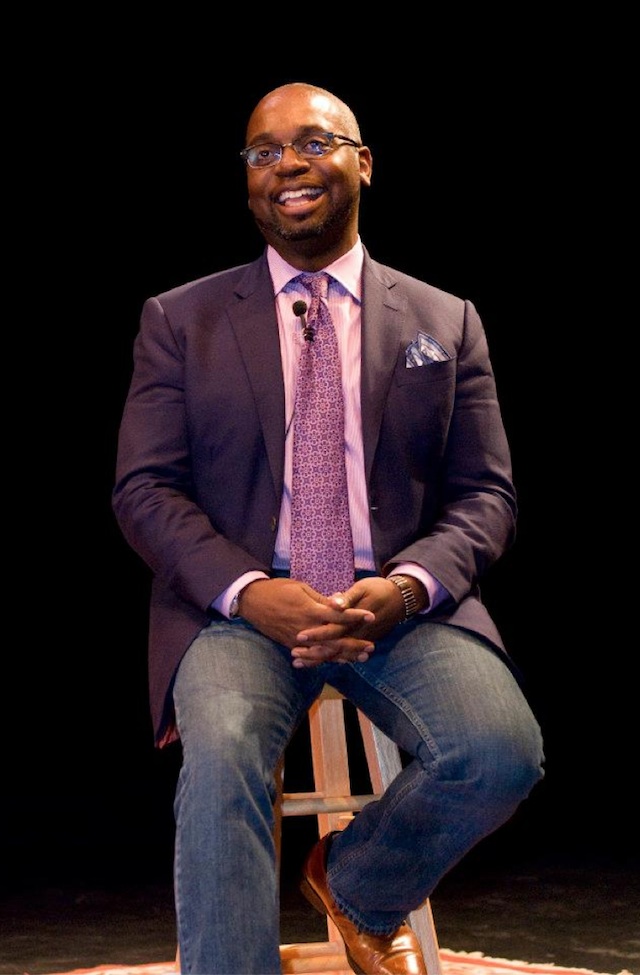
Producer Erickson EB Blakney of TRUE DELTA – A Documentary about Clarksdale, Mississippi and the Blues
“I really love guitar,” said 13-year-old Clarksdale blues prodigy and DBM student Christone ‘Kingfish’ Ingram. “As my Mama would say, ‘I picked up guitar at the age of three.’ I used to always go to Gospel programs and I would drag my guitar up there.” Kingfish can be seen wowing blues lovers and listeners at major area events and at Red’s Lounge at the corner of Sunflower Ave. and MLK Blvd.
“To be able to give back and pass on a little bit of what I have learned over the years; I guess it means a lot to me; it keeps me going,” Perry said. “It gives me something to get up and do. A lot of these kids are really absorbing it and the greatest and most important thing of all is that it is something else to do to keep them from out there in the streets and all that crap that is out there.”
Gentle “Stud” White, T-Model’s young grandson dreams of being like his grandfather one day.
“He has taught me how to contribute myself to the blues industry…, so that when I grow up I can be like him and maybe I can take over his business one day,” White said.
True Delta is true Delta and that is the truth. Do not miss an oportunity to watch, own, and pass on this treasure trove of authenticity squarely-centered around the blues and the culture that spawned it. True Delta y’all! True dat! Poor William
Be sure to visit the TRUE DELTA PROJECT website. There is much to see and read.


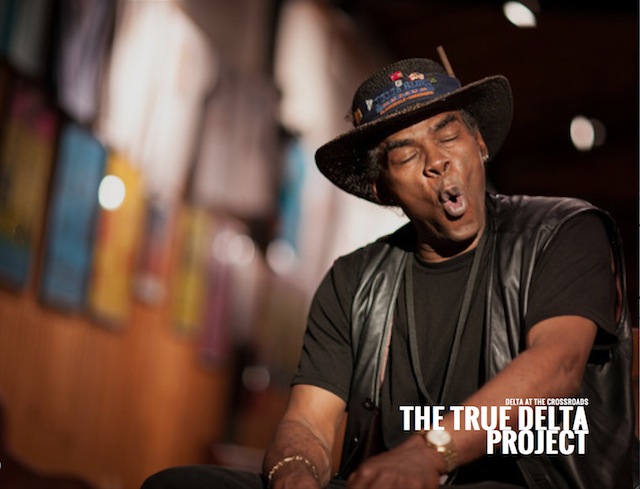
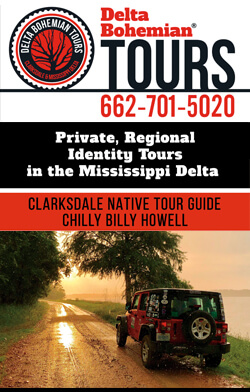





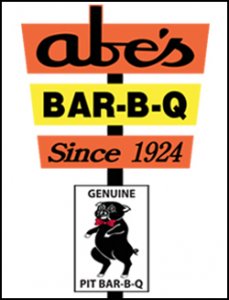
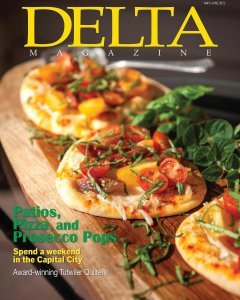


Speak Your Mind